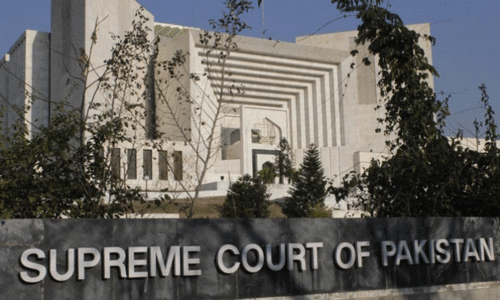ISLAMABAD: The Supreme Court was disappointed on Tuesday when it received no word regarding the initiation of court martial proceedings against two serving military officers accused of being involved in the disappearance of people in Balochistan.
At the last hearing on March 26, the court was told that both federal and provincial governments wanted the men tried. Both served in the Frontier Corps (FC) and were later repatriated to their parent military units when the allegations against them surfaced.
When the case was taken up on Tuesday, a two-member bench headed by Justice Nasir-ul-Mulk asked for updates on action against the military officers, asking whether the authorities had initiated proceedings against them.
However, no-one from the centre or Balochistan had any information on the matter. Deputy Attorney General (DAG) Sajid Ilyas Bhatti told the court he would ask the defence ministry (the competent authority in this case) for an update.
Upon consulting the department concerned, he informed the court that the files regarding the trial of the army officers had not yet reached the relevant office, delaying the commencement of court martial proceedings against them.
The court then ordered the DAG to get in touch with the defence ministry and submit a report detailing all action that has been initiated against the officers in question.
Meanwhile, Balochistan Chief Secretary Babar Yaqoob Fateh Mohammad also submitted a report before the Supreme Court. Babar had earlier been directed by the court to meet FC representatives and the advocate general of Balochistan to discuss the missing persons’ issue.
The report acknowledged that while the Balochistan government was cognizant of its constitutional obligations for the swift recovery of all missing persons, it could not do this alone and required the complete cooperation of the ministries of defence and interior, as well as their subordinate agencies, to make this possible.
Since serious allegations are levelled against federal agencies, the Balochistan government believes that both ministries should explain their position.
In connection with the discovery of mass graves in the Khuzdar area of Balochistan, the Supreme Court summoned an officer from the Punjab Forensic Science Agency (PFSA) to explain why DNA tests of the 13 decomposed bodies recovered from the graves required four to five months and why the tests could not be carried out simultaneously.
The court was told that while the PFSA had prioritised DNA tests of the recovered bodies, it needed more time to cope with a large backlog of cases. The matter will next be heard on May 6.












































